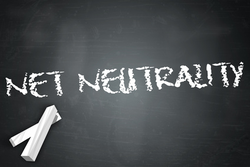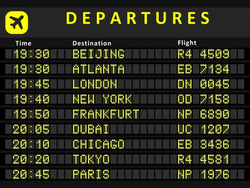
Feb. 27, 2015
Bibliographic Reports

Le 26 février 2015, la Federal Communication Commission, régulateur des communications aux États-Unis impose le principe de "l'Internet ouvert", les gestionnaires du réseau ne pouvant interférer que pour des raisons techniques et non plus commerciales.
C'est un pas décisif, montrant la dimension politique de la Régulation.
En effet, la question est politique. Et le politique a gagné par la Décision qu'a adoptée la Federal Communication Commission en posant le principe d'un "Internet ouvert", forme publique du principe politique pur qu'est la "Neutralité du Net".
Internet est un espace dans circulent de très nombreuses richesses qui sont l'objet de désirs de consommation. Pour que celui qui fait les consommer y procède, il doit d'abord arriver jusqu'au produit virtuel, stocké dans l'espace virtuel, c'est-à-dire circuler sur l'espace virtuel. Il doit donc faire un double acte de consommation, le premier étant l'achat de circulation dans l'espace (circuler plus ou moins vite et plus ou moins bien), le second étant l'achat de consommation du bien (voir le film, par exemple). L'enjeu majeur, dans ce qu'il est convenu d'appeler "l'économie de l'accès" est désormais constitué des conditions du premier acte de consommation.
Face à cette réalité, un choix s'offre : soit laisser faire les mouvements des offreurs et des demandeurs, soit intervenir politiquement par une invention juridique, le droit étant l'arme du politique (I). Le choix ayant été fait d'aller vers le politique par l'affirmation de l'Internet ouvert, la mise en oeuvre du principe au regard des contraintes d'investissement par les opérateurs ne va pas être aisée (II). Dès lors, et comme depuis le départ, la question va sans doute continuer à être judiciaire (III).

Feb. 18, 2015
Sectorial Analysis

February 17, 2015, as the previous "Contrat de Régulation Économique" (Economie Regulatory Contract), the firm Aéroport de Paris (ADP) has made available on its site to all "for consultation" the draft "Contrat de Régulation Economique ("Economic Regulatory Contract) for the period 2016 -2020.
Published in the wake of the meeting of the Board of ADP, the text is presented as a tool "for the Paris place", especially for air transport.
This shows that the document is primarily intended for investors and financial markets, the document being placed on the company website in the section for the "investors".
This illustrates the evolution from the traditional "contrats de plan" (plan contracts). But then, who are the parties to these types of contract?
Indeed, the very term "Regulatory contract" is new in public Law. It appears as a sort of modernization of "plan contract." The Conseil d'État (French State Council) finally admitted the contractual nature of these planning contracts. In these contracts, are parties were the State and the company in charge of a public service.
Because here the contract is an instrument of "economic regulation" the open public consultation draft rather expresses a global conception of ADP, the company which manages the Paris airports, for the future of the development of critical infrastructure that is the airport as the heart of global development of air transport.
The enterprise manager of the airport in the heart of the contract (rather than the State) in setting objectives for the coming four years is the letter and spirit of the French law of 20 April 2005 about Airports, which put the apparatus of this "Contrat de Régulation Economique" in place.
In this, the infrastructure manager is set by law as a "regulator of second degree", as can be a financial market enterprise. The company that manages and develops the Paris airports undoubtedly belongs to the category of " critical firms", as well it manages the future of the sector and helps to keep France a place in the world.
More, A.D.P. behaves like a Regulator, since it is carrying out the "public consultation", the consultation paper prepared by it, being placed on its site and developing its ambitions for the sector and for France. But A.D.P. also expressed as a financial and economic actor, emphasizing the competitive environment, demanding in passing more stability and clarity in the regulation in which it moves ...
That is why the consultation mechanism provided by the law must be more complex. Indeed, ADP can not be judge and jury. Therefore if the project raises observations, they must be formuled not to ADP but to the Ministries of Aviation and Economy, within a month. They shall communicate theiir content to ADP . Then the Commission consultative aéroportaire (French Airport Consultative Committee) will be consulted. At the end of this process, the "Contrat de Régulation Economique" will be signed.
Seing the end of the process, it remains in line with the plan contracts, since it remains the Economic Regulatory Contract is signed between the State and the essential infrastructure manager. But the consultation process shows firstly investors are the first recipients of the statements made by a privatized company presenting its draft primarily in terms of competitive context and international development and secondly the airlines that use daily services of the airports are also directly involved by theses questions of tarification.
Airlines protest against the increase in the money that will be asked. This will be imposed, since it is tarification and princing public policy. We are in unilateral rules. But it is indeed a "price" they feel to pay, they also heard a speech referring to competition in what the mechanism is presented as a "contract".
But then, does it take to admit that these "contracts for economic regulation" are not between two parties that are the state and the regulator of second degree that is the infrastructure manager but must be three, the State, the infrastructure manager and "stakeholders" that are mainly airlines?
This practical difficulty is much to the fact that the qualification of "contract" is difficult to justify in proceeding in which prevail unilateral mechanisms.
